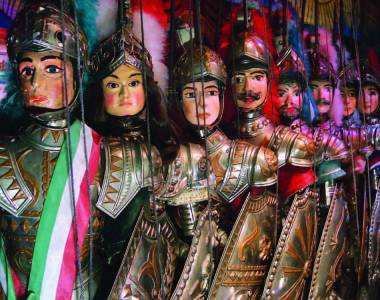In the present fragmented regional and national cultural policy about ICH, the COVID-19 pandemic has deeply affected Sicilian Opera dei Pupi that, as a living heritage, exists thanks to the constant relation with its audiences and the new generations. Past May, the 12 companies from all over Sicily, members of the “Rete italiana di organismi per la tutela, promozione e valorizzazione dell’opera dei pupi” Italian Network of organisations for the Opera dei Pupi safeguarding, promotion and valorisation reacted at the crises provoked by the new pandemic context and the lockdown (sudden interruption of any theatrical, cultural and educational activities).
In fact, among the most relevant consequences, there have been: the cancelation of scheduled shows, and of Spring/Summer tours as well as of all the education programs and activities aimed at raising awareness about the importance of ICH as well as disseminating and transmitting its values; the difficulty to find spaces where to perform regularly while guaranteeing social distancing and obeying to the Government and institutions’ anti COVID-19 adopted measures.
It is worth to be said that the oral transmission of Sicilian puppeteers’ heritage has always been strictly linked to the improvised performances characterized by a complex and articulated system of traditional performative codes. This is why the cancellation of the scheduled shows and the interruption of cultural/education activities, and the impossibility/difficulty to plan others in the future (cultural, theatrical, and educational, is not easy to be planned), is actually provoking a real risk to seriously interrupt the transmission process necessary to safeguard the puppeteers’ heritage and inspire their creativity deeply depending on the participatory performances.
Following some consultations organized by the Network’s representative community, the Association for the Conservation of Folk Traditions of Palermo, a twofold action plan has been outlined aimed at building resilience in the immediate term and transformation in the long term: some innovative activities (e.g. the creation of a participatory catalogue and inventory of the objects conserved by each company - puppets, backdrops, canvas, etc. - in order to allow its public use through the Network’s on line platform; some emergency measures have been identified to provide economic support and create a new opportunity to perform and address the audiences (e.g. the organisation of a Summer program in the whole region and education programs addressed to school children and students in collaboration with the Regional Government).
The main focus of each activity carried out, including the communication plan, has been the importance of ICH and the necessity to safeguard Sicilian Opera dei Pupi within a wider awareness raising project aimed to engage firstly (but not exclusively) all local institutions (cultural heritage, education, and tourism departments) - and the whole civil society.
In the immediate term, there has been a massive positive reaction and a wide support (the press release about the Opera dei Pupi crisis published on FB reached almost 63.000 people and provoked almost 3.000 direct reactions, and had a great impact also on the press thus becoming a real call to action.
Among the most representative and engaging activities, there has been the Opera dei Pupi Day, which took place on July 18 and was organized in collaboration with the Regional Department of Cultural Heritage and Sicilian Identity and the Italian Ministry of Culture and Tourism.
In a context as problematic as the post COVID-19 one, the initiative involved 10 Opera dei Pupi companies that performed in 6 Sicilian towns of 5 provinces: in spite of the social distancing restrictions, the community was able to met its audience as well as representatives of the institutions.
Les désignations employées et la présentation des textes et des documents référencés dans cette plateforme n'impliquent de la part de l'UNESCO aucune prise de position quant au statut juridique des pays, territoires, villes ou zones, ou de leurs autorités, ni quant au tracé de leurs frontières ou limites.
